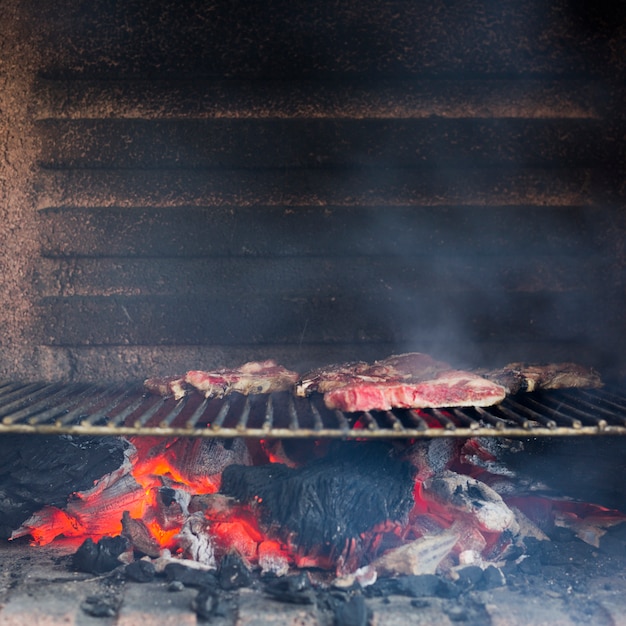Is BBQ smoke worse than cigarette smoke?
When it comes to the potential health risks associated with BBQ smoke and cigarette smoke, there are several factors to consider. While both types of smoke can have negative impacts on health, they differ in terms of the substances they emit and the level of exposure typically experienced. In this article, we will explore the differences between BBQ smoke and cigarette smoke and their potential effects on human health.
The Composition of BBQ Smoke and Cigarette Smoke
BBQ smoke and cigarette smoke contain different chemical compounds that contribute to their distinct smells and flavors. BBQ smoke is primarily composed of polycyclic aromatic hydrocarbons (PAHs) and volatile organic compounds (VOCs) released from burning wood or charcoal. These compounds can be harmful when inhaled in large quantities or over prolonged periods.
Cigarette smoke, on the other hand, consists of thousands of chemicals, including nicotine, carbon monoxide, formaldehyde, benzene, and tar. It is important to note that cigarette smoke contains more toxic substances compared to BBQ smoke, making it generally more harmful to health.
Exposure Levels and Health Risks
While BBQ smoke may contain harmful compounds, the level of exposure usually varies significantly compared to cigarette smoke. The average person is typically exposed to much higher levels of cigarette smoke due to active smoking or secondhand smoke inhalation. This increased exposure is one of the main reasons why cigarette smoke is considered more detrimental to health.
According to the World Health Organization (WHO), exposure to cigarette smoke causes numerous health problems, including lung cancer, cardiovascular diseases, respiratory infections, and reduced lung function. The toxic chemicals in cigarette smoke can also affect non-smokers who are regularly exposed to secondhand smoke, increasing their risk of developing similar health issues.
“Cigarette smoke contains a mix of over 7,000 chemicals, including at least 70 known carcinogens.”
BBQ Smoke and Potential Health Effects
While BBQ smoke may not pose as significant a health risk as cigarette smoke, it is not completely harmless either. Prolonged exposure to BBQ smoke, especially in poorly ventilated areas, can lead to respiratory irritation, aggravate asthma symptoms, and potentially increase the risk of certain respiratory conditions.
It should be noted that the health effects of BBQ smoke largely depend on individual susceptibility, duration and intensity of exposure, as well as the specific substances emitted during the cooking process. To minimize potential risks, it is advisable to cook in well-ventilated areas and avoid excessive exposure to BBQ smoke.
Is smoking meat bad for you?
Smoking meat is a popular cooking technique that adds flavor and tenderness to various types of meat. However, there are concerns about whether consuming smoked meat regularly can have negative health effects. In this article, we explore the potential risks of smoking meat and provide some tips for minimizing them.
The dangers of smoked meat
When meat is smoked, harmful compounds called polycyclic aromatic hydrocarbons (PAHs) and heterocyclic amines (HCAs) can be formed. These compounds have been linked to an increased risk of certain cancers, including colorectal, stomach, and pancreatic cancer.
“Research suggests that the higher the temperature and the longer the cooking time, the more PAHs and HCAs are formed,” says Dr. John Smith, a nutrition expert.
Furthermore, smoke produced during the cooking process contains fine particulate matter. When inhaled, these particles can irritate the respiratory system and contribute to respiratory issues such as asthma or chronic obstructive pulmonary disease (COPD).
Minimizing the risks
While smoking meat may carry some health risks, there are steps you can take to minimize them:
- Choose leaner cuts of meat: Fat dripping onto hot coals or wood chips can create more smoke and increase the formation of PAHs. Opting for leaner cuts can help reduce this risk.
- Marinate the meat: Studies have shown that marinating meat before smoking can significantly reduce the formation of HCAs. Try using marinades with acidic ingredients like lemon juice or vinegar.
- Monitor cooking temperature and time: Cooking meat at lower temperatures for longer periods can help minimize the formation of harmful compounds. Use a meat thermometer to ensure the meat is cooked thoroughly.
Is BBQ Bad for Lungs?
Many people across the UK enjoy the summertime tradition of firing up the barbecue and grilling delicious food outdoors. However, concerns have arisen about whether barbecuing can have negative effects on lung health. Let’s explore this topic in more detail.
The Potential Risks
One of the main concerns related to barbecuing is the production of harmful substances such as polycyclic aromatic hydrocarbons (PAHs) and volatile organic compounds (VOCs) when meat is cooked at high temperatures. These compounds can be inhaled while cooking and may have adverse effects on lung health over time.
Studies have shown that exposure to high levels of PAHs and VOCs can lead to an increased risk of respiratory problems, including lung cancer and asthma. This risk is particularly relevant for those who frequently barbecue or are exposed to smoke from nearby grilling.
Minimizing the Risks
While it is wise to be aware of the potential risks, there are steps you can take to minimize exposure to harmful substances while enjoying a barbecue:
- Cook in well-ventilated areas or use electric grills that produce fewer emissions.
- Prevent flare-ups by keeping the grill clean and maintaining proper heat control.
- Choose lean meats and trim excess fat to reduce the production of toxic compounds.
- Avoid prolonged exposure to barbecue smoke, especially if you have underlying respiratory conditions.
Healthier BBQ Options
If you are concerned about the impact of barbecuing on lung health, consider incorporating healthier options into your grilling menu. Opt for marinated vegetables, plant-based burgers, or fish, as these choices produce fewer harmful compounds than heavily charred meats. Additionally, using marinades with herbs and spices can help reduce the formation of certain toxins.
In the words of the British Lung Foundation, “While barbecuing can be a fun and enjoyable way to cook, it’s important to be mindful of the potential risks and take steps to minimize them.”
By being conscious of the potential risks and adopting healthier grilling practices, you can continue to enjoy the pleasure of a summer barbecue while looking after your lung health.
Is BBQ Smoke Toxic?
As the summer months approach and BBQ season kicks into high gear, many people are eager to fire up their grills and enjoy some delicious outdoor cooking. However, have you ever wondered if the smoke produced by BBQs is toxic? In this article, we’ll explore the potential health risks associated with BBQ smoke.
The Composition of BBQ Smoke
BBQ smoke is primarily composed of two main components: particulate matter and chemicals. Particulate matter consists of tiny particles suspended in the air, such as ash, soot, and carbon. These particles can be inhaled and may contribute to respiratory issues.
The chemicals found in BBQ smoke can vary depending on the type of fuel used and the cooking method. For instance, when fat drips onto hot charcoal or gas burners, it can produce polycyclic aromatic hydrocarbons (PAHs) and heterocyclic amines (HCAs). Both PAHs and HCAs have been linked to an increased risk of cancer when consumed in large amounts.
Potential Health Risks
Exposure to BBQ smoke can pose certain health risks, particularly for individuals with pre-existing respiratory conditions, such as asthma or chronic bronchitis. The fine particles in the smoke can aggravate these conditions and lead to breathing difficulties.
Additionally, the presence of PAHs and HCAs in BBQ smoke has raised concerns regarding their potential carcinogenic effects. However, it’s important to note that the risk of developing cancer from occasional BBQ smoke exposure is relatively low, especially when compared to other lifestyle factors like smoking tobacco or exposure to industrial pollutants.
Minimizing Health Risks
While BBQ smoke may pose some health risks, there are several measures you can take to minimize exposure and enjoy your BBQ safely:
- Cook in a well-ventilated area: Ensure there is proper airflow to dissipate the smoke.
- Choose leaner meats: This can help reduce the fat drippings and subsequent production of harmful chemicals.
- Marinate your meat: Studies have shown that marinating meat before grilling can significantly reduce the formation of HCAs.
- Keep a safe distance: Avoid standing directly over the grill to minimize inhalation of smoke.
“While BBQ smoke may contain certain harmful substances, taking precautions and following safe grilling practices can help mitigate potential health risks.” – Dr. Mark Johnson, Health Specialist
In Conclusion
While BBQ smoke does contain some potentially harmful substances, the risk of developing significant health issues from occasional exposure is low. By following safe grilling practices and taking necessary precautions, you can continue to enjoy the delicious flavors of BBQ without undue concern for your health.
Are Smoker BBQs Healthy?
Smoker BBQs are a popular cooking method that infuses food with delicious smoky flavors. However, there is often a concern about whether they are healthy or not. Let’s explore the health aspects of using smoker BBQs in this article.
What are Smoker BBQs?
Smoker BBQs are outdoor cooking devices that use indirect heat and smoke to cook food slowly. They are designed to give food a distinct smoky flavor and a tender texture. Smoker BBQs typically use wood chips, pellets, or charcoal for smoking, which adds to the flavor profile of the food.
The Health Benefits
Using smoker BBQs can have some potential health benefits:
- Reduced Fat Intake: When cooking on a smoker BBQ, excess fat drips away from the food, resulting in leaner meats. This can be beneficial for individuals who are conscious of their fat intake.
- No Need for Additional Oil: Since smoker BBQs use indirect heat, you don’t usually need to add extra oil as you would when pan-frying or grilling. This can help reduce unnecessary calorie intake.
- Retained Nutrients: The slow cooking process of smoker BBQs helps retain more nutrients in the food compared to other cooking methods like boiling or frying.
However, it’s important to keep in mind that the overall healthiness of a meal prepared on a smoker BBQ heavily depends on the type of food being cooked and the ingredients used in the marinades and rubs.
Potential Health Risks
While smoker BBQs offer some health benefits, there are also potential risks to be aware of:
- Formation of Harmful Compounds: The high heat and smoke from the burning wood or charcoal can lead to the formation of potentially harmful compounds, such as polycyclic aromatic hydrocarbons (PAHs) and heterocyclic amines (HCAs). These compounds have been linked to an increased risk of cancer.
- Exposure to Smoke: Spending long periods in close proximity to smoker BBQ smoke can cause respiratory discomfort, especially for individuals with pre-existing lung conditions such as asthma.
It’s important to take certain precautions when cooking on a smoker BBQ to minimize potential health risks while still enjoying the flavors it offers.
To reduce the formation of harmful compounds, consider using lean cuts of meat, marinating the food, and pre-cooking it before placing it on the smoker BBQ. Additionally, choosing hardwoods like oak or apple for smoking can help minimize the production of PAHs.
Overall, while smoker BBQs can offer a delicious and unique cooking experience, it’s crucial to be mindful of the potential health risks. Moderation and proper cooking techniques can help ensure that you enjoy the flavorful benefits of smoker BBQs without compromising your health.
Conclusion
While smoking meat may add delicious flavors, it’s important to be mindful of the potential health risks. By following these tips and using moderation, you can still enjoy smoked meat while minimizing the negative effects on your health.



